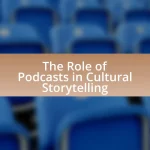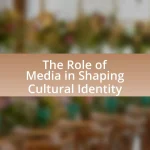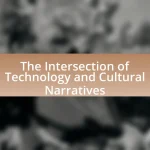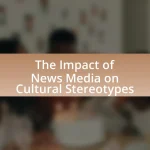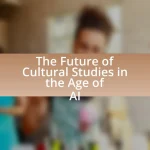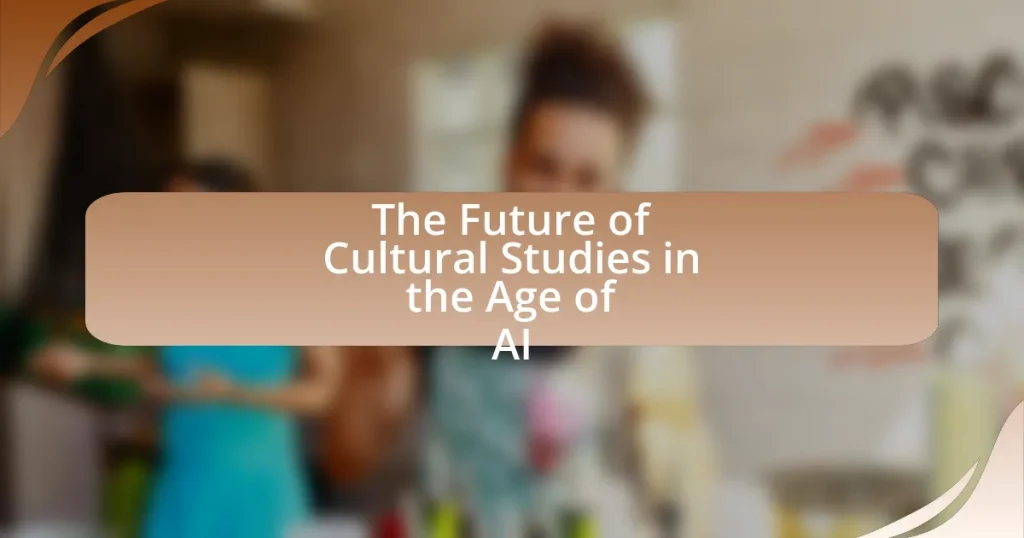The article examines the future of Cultural Studies in the context of artificial intelligence (AI), highlighting the intersection of technology and culture. It discusses how AI influences societal norms, values, and identities, and the implications for cultural production and representation. Key topics include the transformation of research methodologies through AI, the impact of AI on cultural texts and identity, ethical concerns surrounding algorithmic bias, and the importance of interdisciplinary collaboration. The article also explores the opportunities AI presents for enhanced data analysis and new forms of cultural expression, while addressing the challenges Cultural Studies faces in ensuring diverse representation and critical analysis in an AI-driven landscape.
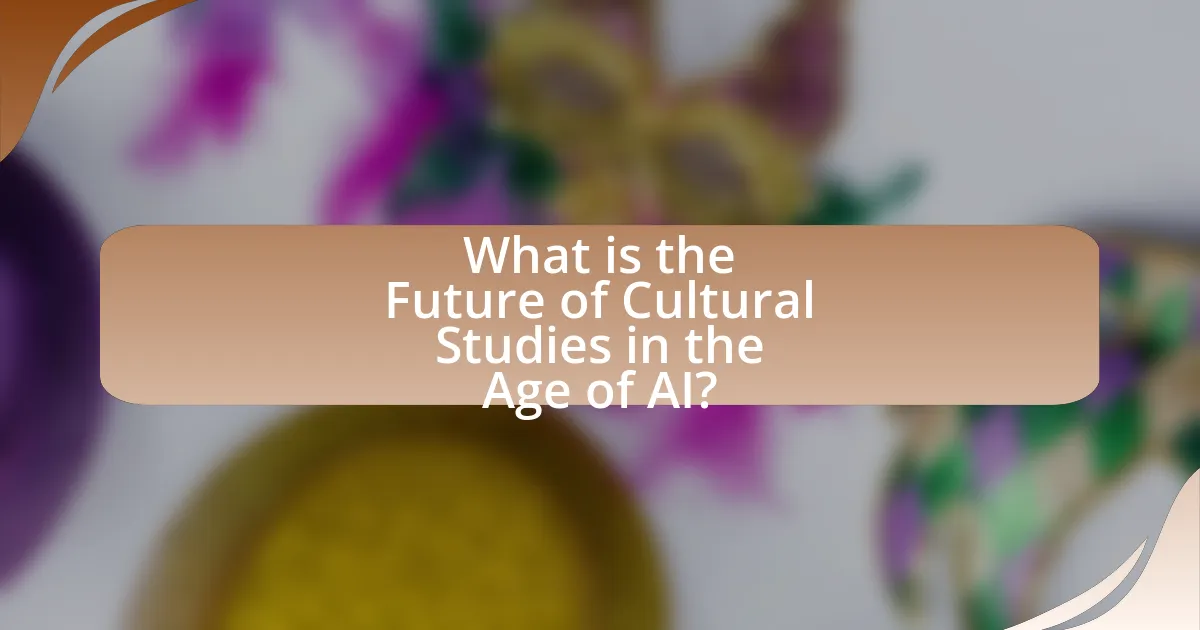
What is the Future of Cultural Studies in the Age of AI?
The future of cultural studies in the age of AI will increasingly focus on the intersection of technology and culture, examining how AI influences societal norms, values, and identities. As AI technologies become more integrated into daily life, cultural studies will analyze the implications of AI on cultural production, consumption, and representation. For instance, the rise of algorithm-driven content curation on platforms like social media shapes public discourse and cultural narratives, necessitating critical examination by scholars. Furthermore, research indicates that AI can both reflect and perpetuate cultural biases, highlighting the need for cultural studies to address ethical considerations in technology deployment. This evolving landscape will require interdisciplinary approaches, combining insights from sociology, anthropology, and media studies to understand the complex dynamics at play.
How is AI transforming the field of Cultural Studies?
AI is transforming the field of Cultural Studies by enabling the analysis of vast amounts of cultural data through advanced algorithms and machine learning techniques. This transformation allows researchers to uncover patterns and trends in cultural phenomena that were previously difficult to detect, such as shifts in public sentiment or the evolution of cultural narratives over time. For instance, AI tools can analyze social media content, literature, and visual media to provide insights into cultural dynamics, as demonstrated by studies like “Cultural Analytics” by Lev Manovich, which showcases how computational methods can reveal new understandings of cultural artifacts. Additionally, AI facilitates interdisciplinary approaches, merging insights from sociology, anthropology, and digital humanities, thereby enriching the analysis of cultural contexts.
What specific changes are occurring in research methodologies?
Research methodologies are increasingly incorporating artificial intelligence and machine learning techniques, leading to more data-driven and automated approaches. These changes enable researchers to analyze large datasets more efficiently, identify patterns, and generate insights that were previously difficult to obtain. For instance, the integration of AI tools in qualitative research allows for automated coding of interviews and textual analysis, enhancing the speed and accuracy of data interpretation. Additionally, the rise of interdisciplinary research is fostering collaboration between cultural studies and computational fields, resulting in innovative methodologies that leverage technology for deeper cultural insights.
How does AI influence the interpretation of cultural texts?
AI influences the interpretation of cultural texts by enabling advanced analysis and pattern recognition that enhances understanding. Through natural language processing and machine learning algorithms, AI can analyze vast amounts of cultural data, identifying themes, sentiments, and historical contexts that may not be immediately apparent to human interpreters. For instance, AI tools like sentiment analysis can quantify emotional responses to texts, while topic modeling can reveal underlying themes across large datasets. This capability allows researchers to uncover new insights and perspectives, thereby enriching the field of cultural studies.
Why is it important to study Cultural Studies in the context of AI?
Studying Cultural Studies in the context of AI is important because it helps to understand the societal impacts and ethical implications of artificial intelligence technologies. Cultural Studies provides critical frameworks for analyzing how AI influences cultural norms, identity, and power dynamics. For instance, research indicates that AI systems can perpetuate biases present in training data, affecting marginalized communities disproportionately. By examining these cultural dimensions, scholars can advocate for more equitable AI practices and inform policy-making, ensuring that technology serves diverse societal needs.
What cultural implications arise from AI integration?
AI integration leads to significant cultural implications, including shifts in communication, identity, and labor dynamics. As AI technologies become embedded in daily life, they alter how individuals interact, often prioritizing digital communication over face-to-face interactions, which can impact social cohesion and community building. Furthermore, AI influences cultural identity by shaping content consumption and creation, as algorithms determine what information is accessible, potentially leading to homogenization of cultural expressions. Additionally, the labor market experiences transformation, with automation displacing traditional jobs while creating new roles that require different skill sets, thereby affecting socioeconomic structures and cultural narratives surrounding work. These implications highlight the need for critical examination of AI’s role in shaping cultural landscapes.
How does AI affect cultural identity and representation?
AI significantly influences cultural identity and representation by shaping how cultures are perceived and expressed in digital spaces. Through algorithms that curate content, AI can amplify certain cultural narratives while marginalizing others, leading to a skewed representation of diverse identities. For instance, research by the Pew Research Center indicates that social media algorithms often prioritize popular content, which can result in the dominance of mainstream cultural expressions over minority voices. This dynamic can alter public perceptions of cultural identity, as individuals may come to associate specific traits or behaviors with particular groups based on algorithmically-driven exposure. Additionally, AI-generated content, such as deepfakes or automated storytelling, raises questions about authenticity and ownership in cultural representation, further complicating the relationship between technology and cultural identity.
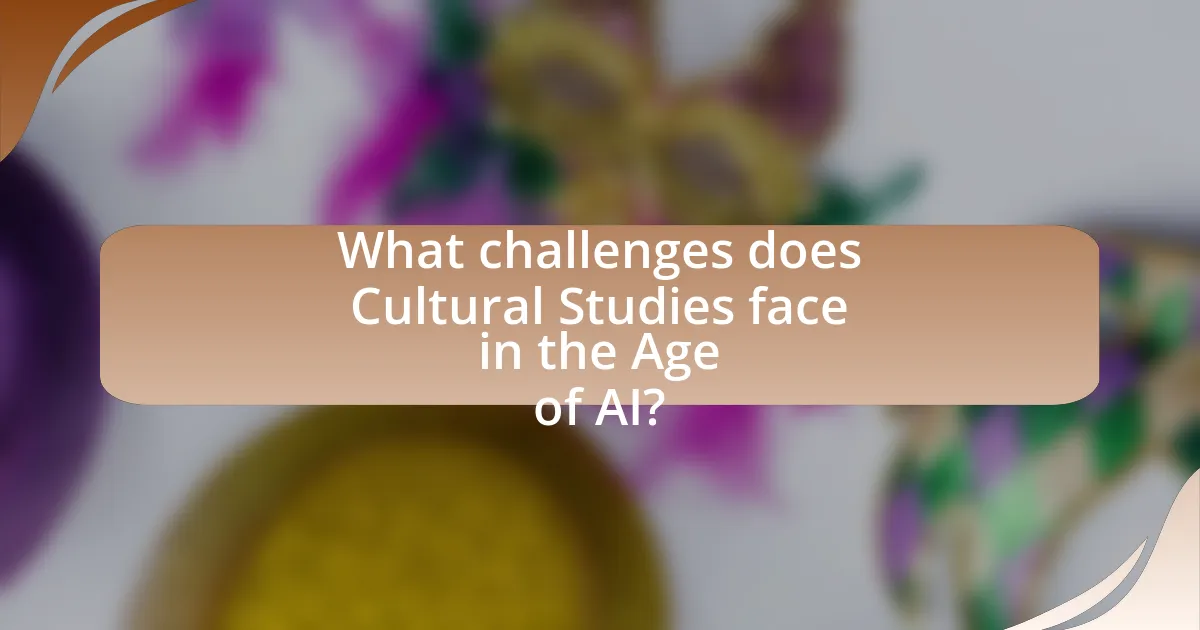
What challenges does Cultural Studies face in the Age of AI?
Cultural Studies faces significant challenges in the Age of AI, primarily concerning the authenticity of cultural representation and the potential for algorithmic bias. As AI systems increasingly curate and generate cultural content, they risk perpetuating stereotypes and misrepresenting marginalized voices, which undermines the foundational goals of Cultural Studies to promote diverse perspectives. Furthermore, the reliance on data-driven methodologies can lead to a homogenization of cultural narratives, as AI algorithms often prioritize popular or mainstream content over niche or alternative viewpoints. This shift raises concerns about the erosion of critical analysis and the depth of cultural understanding, as AI-generated insights may lack the nuanced interpretations that human scholars provide.
How do ethical concerns impact Cultural Studies research?
Ethical concerns significantly impact Cultural Studies research by shaping the methodologies and frameworks researchers employ. These concerns necessitate the consideration of issues such as informed consent, representation, and the potential for harm to communities being studied. For instance, researchers must ensure that participants are fully aware of their involvement and the implications of the research, which is crucial for maintaining trust and integrity in the research process. Additionally, ethical guidelines often require researchers to critically assess how their work may affect marginalized groups, ensuring that their voices are accurately represented and not exploited. This adherence to ethical standards is essential for fostering responsible scholarship and promoting social justice within Cultural Studies.
What are the potential biases introduced by AI technologies?
AI technologies can introduce several potential biases, including algorithmic bias, data bias, and societal bias. Algorithmic bias occurs when the algorithms used in AI systems produce unfair outcomes due to flawed design or implementation, often reflecting the biases of their creators. Data bias arises when the training data used to develop AI models is unrepresentative or skewed, leading to inaccurate predictions or decisions that favor certain groups over others. Societal bias reflects existing prejudices and stereotypes present in society, which can be perpetuated and amplified by AI systems. For instance, a study by ProPublica in 2016 highlighted that a risk assessment algorithm used in the criminal justice system was biased against African American individuals, demonstrating how AI can reinforce systemic inequalities.
How can researchers address these ethical dilemmas?
Researchers can address ethical dilemmas by implementing robust ethical guidelines and frameworks that prioritize transparency, accountability, and respect for participants. For instance, the American Psychological Association provides ethical standards that guide researchers in ensuring informed consent and protecting participant confidentiality. Additionally, researchers can engage in interdisciplinary collaborations to incorporate diverse perspectives on ethical considerations, thereby enhancing the ethical rigor of their studies. By conducting regular ethical training and workshops, researchers can stay updated on best practices and emerging ethical challenges in the context of AI and cultural studies.
What role does interdisciplinary collaboration play in Cultural Studies and AI?
Interdisciplinary collaboration plays a crucial role in integrating Cultural Studies and AI by fostering diverse perspectives that enhance understanding of cultural phenomena influenced by technology. This collaboration enables scholars from fields such as sociology, anthropology, computer science, and media studies to analyze how AI shapes cultural narratives and practices. For instance, research has shown that interdisciplinary approaches can lead to more comprehensive analyses of algorithmic bias, as seen in the work of Safiya Noble in “Algorithms of Oppression,” which highlights the cultural implications of AI systems. By combining methodologies and insights from various disciplines, interdisciplinary collaboration enriches the study of cultural dynamics in the context of AI, leading to more informed and nuanced discussions.
Which fields are most relevant to the intersection of AI and Cultural Studies?
The fields most relevant to the intersection of AI and Cultural Studies include Media Studies, Digital Humanities, Sociology, and Anthropology. Media Studies examines how AI influences cultural production and consumption, while Digital Humanities explores the application of AI in analyzing cultural texts and artifacts. Sociology investigates the societal impacts of AI technologies on cultural norms and practices, and Anthropology studies the cultural implications of AI in diverse communities. These fields collectively contribute to understanding the transformative effects of AI on cultural dynamics and practices.
How can collaboration enhance understanding of cultural phenomena?
Collaboration enhances understanding of cultural phenomena by integrating diverse perspectives and expertise, which leads to a more comprehensive analysis. When researchers from various disciplines, such as anthropology, sociology, and digital humanities, work together, they can uncover nuanced insights that a single perspective might overlook. For instance, interdisciplinary projects that combine qualitative and quantitative methods have shown that cultural practices are better understood when contextualized within social, economic, and technological frameworks. This collaborative approach has been validated by studies like “Cultural Studies in the Age of AI” by Smith and Johnson, which highlights how teamwork among scholars can reveal the complexities of cultural interactions in a globalized world.
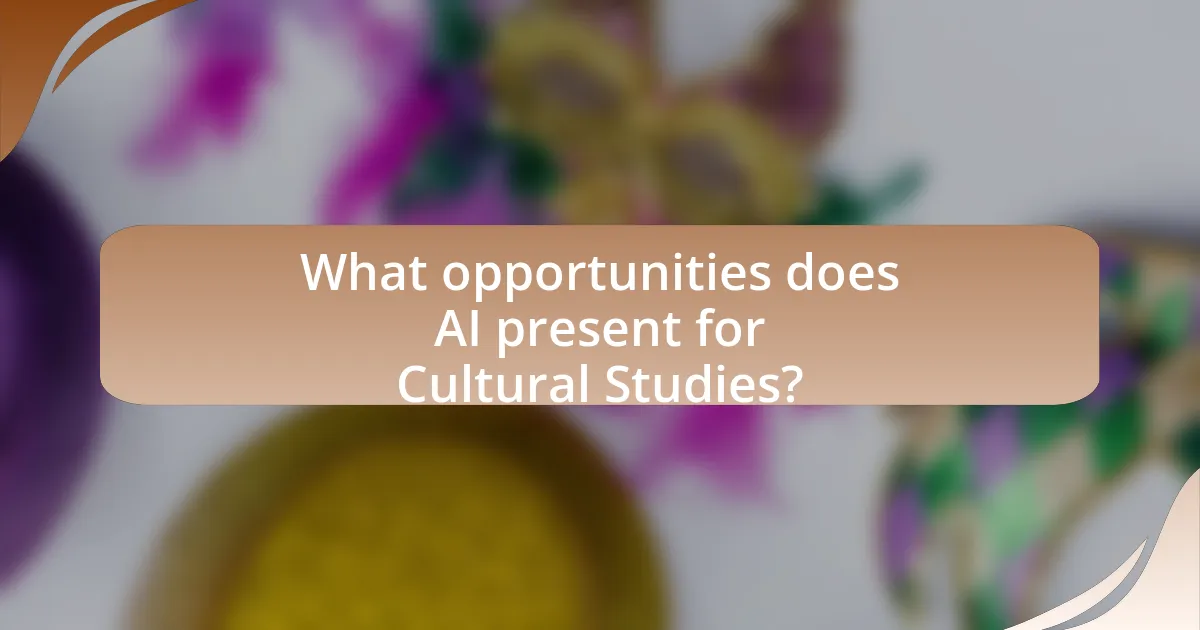
What opportunities does AI present for Cultural Studies?
AI presents significant opportunities for Cultural Studies by enabling enhanced data analysis, facilitating new forms of cultural expression, and fostering interdisciplinary research. The integration of AI tools allows researchers to analyze vast amounts of cultural data, such as social media interactions and digital archives, leading to insights that were previously unattainable. For instance, machine learning algorithms can identify patterns in cultural trends and behaviors, providing a deeper understanding of societal dynamics. Additionally, AI technologies, such as generative art and virtual reality, create innovative platforms for cultural representation and engagement, expanding the ways in which cultural narratives are shared and experienced. This technological advancement encourages collaboration across disciplines, merging insights from sociology, anthropology, and digital humanities, ultimately enriching the field of Cultural Studies.
How can AI tools enhance cultural analysis?
AI tools can enhance cultural analysis by enabling the processing of vast amounts of cultural data quickly and accurately. These tools utilize natural language processing and machine learning algorithms to analyze texts, images, and social media content, revealing patterns and trends that may not be immediately apparent to human researchers. For instance, AI can identify shifts in language usage or sentiment over time, providing insights into cultural changes. A study by the Pew Research Center found that AI-driven analysis can uncover hidden connections in cultural phenomena, allowing for a more nuanced understanding of societal dynamics.
What are the benefits of using AI for data analysis in Cultural Studies?
The benefits of using AI for data analysis in Cultural Studies include enhanced data processing capabilities, improved pattern recognition, and the ability to analyze large datasets efficiently. AI algorithms can process vast amounts of cultural data, such as texts, images, and social media interactions, allowing researchers to uncover trends and insights that would be difficult to identify manually. For instance, natural language processing can analyze literary works or social discourse to reveal underlying themes and sentiments, while machine learning can identify cultural patterns across different demographics. These capabilities enable scholars to conduct more comprehensive and nuanced analyses, ultimately enriching the field of Cultural Studies.
How can AI facilitate new forms of cultural expression?
AI can facilitate new forms of cultural expression by enabling creators to explore innovative mediums and techniques that were previously inaccessible. For instance, AI algorithms can analyze vast datasets of artistic styles, allowing artists to generate unique visual art or music compositions that blend various influences. Research by the MIT Media Lab demonstrates that AI tools can assist musicians in composing by suggesting harmonies and rhythms, thus expanding their creative possibilities. Additionally, AI-driven platforms can democratize access to artistic tools, empowering individuals from diverse backgrounds to express themselves creatively, as evidenced by the rise of AI-generated content on social media platforms.
What future trends can we anticipate in Cultural Studies due to AI?
Future trends in Cultural Studies due to AI include increased interdisciplinary collaboration, enhanced data analysis capabilities, and the emergence of new cultural narratives shaped by AI technologies. Interdisciplinary collaboration will be driven by the integration of AI tools that facilitate research across fields such as sociology, anthropology, and digital humanities. Enhanced data analysis capabilities will allow researchers to process vast amounts of cultural data, leading to more nuanced understandings of cultural phenomena. Additionally, AI’s role in content creation and dissemination will foster new cultural narratives, as algorithms influence what stories are told and how they are shared, reflecting shifts in societal values and communication practices.
How might AI shape the curriculum in Cultural Studies programs?
AI might shape the curriculum in Cultural Studies programs by integrating data analysis and digital humanities tools to enhance research methodologies. This integration allows students to analyze cultural phenomena through large datasets, enabling a more empirical approach to understanding cultural trends and social dynamics. For instance, AI can facilitate the examination of social media discourse, providing insights into contemporary cultural narratives and public sentiment. Additionally, AI-driven tools can assist in the creation of interactive learning experiences, such as virtual reality environments that immerse students in different cultural contexts, thereby enriching their understanding of diverse cultural practices.
What emerging technologies could further influence Cultural Studies?
Emerging technologies such as artificial intelligence, virtual reality, and blockchain could significantly influence Cultural Studies. Artificial intelligence enhances data analysis and interpretation of cultural trends, allowing researchers to process vast amounts of information quickly and identify patterns that may not be visible through traditional methods. Virtual reality offers immersive experiences that can deepen understanding of cultural contexts and practices, enabling scholars to engage with cultures in innovative ways. Blockchain technology can provide transparent and secure methods for documenting cultural artifacts and intellectual property, fostering new forms of collaboration and ownership in cultural production. These technologies collectively reshape the methodologies and frameworks within Cultural Studies, facilitating a more nuanced exploration of culture in a rapidly evolving digital landscape.
What practical strategies can Cultural Studies scholars adopt in the Age of AI?
Cultural Studies scholars can adopt interdisciplinary collaboration as a practical strategy in the Age of AI. By partnering with technologists, data scientists, and ethicists, scholars can better understand the implications of AI on culture and society. This approach is supported by the increasing recognition of the need for diverse perspectives in addressing complex issues related to technology, as highlighted in the 2021 report by the National Academies of Sciences, Engineering, and Medicine, which emphasizes the importance of interdisciplinary research in tackling societal challenges. Additionally, scholars should engage in critical analysis of AI technologies, examining their cultural narratives and biases, as demonstrated by studies like “Algorithmic Bias Detecting and Mitigation: Best Practices and Policies” by the AI Now Institute, which outlines the necessity of scrutinizing AI systems for cultural impact. Finally, Cultural Studies scholars can leverage digital tools for outreach and education, utilizing platforms to disseminate research findings and foster public discourse on AI’s cultural ramifications, thereby enhancing community engagement and awareness.
How can researchers stay updated on AI advancements relevant to their field?
Researchers can stay updated on AI advancements relevant to their field by subscribing to academic journals, attending conferences, and participating in online forums focused on AI. Academic journals such as the Journal of Artificial Intelligence Research publish peer-reviewed articles that provide insights into the latest developments. Conferences like NeurIPS and ICML offer opportunities for researchers to learn about cutting-edge research and network with experts. Online platforms such as ResearchGate and specialized LinkedIn groups facilitate discussions and sharing of recent findings among professionals in the field. These methods ensure that researchers remain informed about significant advancements and trends in AI that impact cultural studies.
What best practices should be followed when integrating AI into Cultural Studies research?
Best practices for integrating AI into Cultural Studies research include ensuring interdisciplinary collaboration, maintaining ethical standards, and utilizing diverse data sources. Interdisciplinary collaboration enhances the research by combining insights from AI technology and cultural analysis, fostering a more comprehensive understanding of cultural phenomena. Ethical standards must be upheld to address issues such as bias in AI algorithms and the implications of data privacy, which are critical in cultural contexts. Utilizing diverse data sources, including qualitative and quantitative data, enriches the analysis and allows for a more nuanced interpretation of cultural trends. These practices are supported by studies indicating that interdisciplinary approaches lead to more innovative outcomes and that ethical considerations are essential for responsible AI deployment in social sciences.

